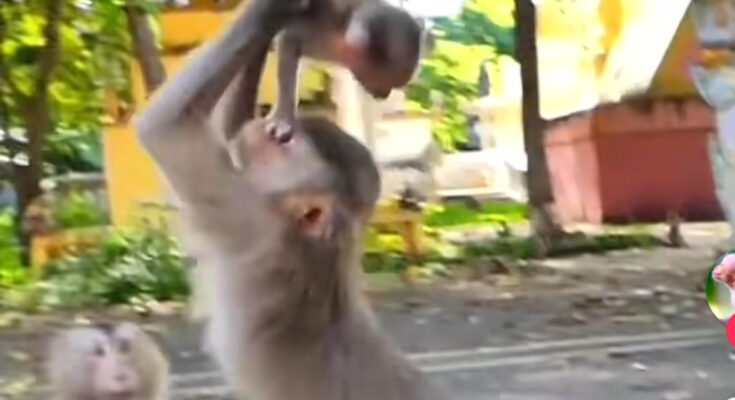In the dense canopy of tropical forests, the circle of life plays out daily in ways that are both awe-inspiring and brutal. Recently, a heartbreaking incident emerged from the primate world that left many animal lovers and researchers shaken: a baby monkey was fatally attacked, its skull crushed, by a larger member of its own species. This rare but not unheard-of act sheds light on the complex—and sometimes violent—social dynamics of monkey troops in the wild.
While it’s easy to romanticize animals as peaceful or innocent, nature often tells a different story. Among many primate species, infanticide can occur under specific circumstances, particularly when dominance, mating rights, or troop leadership is challenged. In this recent case, observers report that a larger male monkey—possibly a new alpha—attacked the infant during a troop transition, a common trigger for such behavior.
The baby, too small to defend itself, succumbed to fatal injuries after the adult monkey reportedly crushed its skull. Incidents like these are disturbing, yet they are not acts of senseless cruelty in the animal kingdom. For some primates, including langurs and baboons, new dominant males may kill existing infants to bring nursing females back into estrus, thereby allowing the male to pass on his genes. This evolutionary strategy, while horrifying to witness, has been documented across several species and serves a cold, biological purpose.
Experts in primatology explain that such violence is part of a complex social structure. Monkey troops are governed by hierarchies where status determines access to food, shelter, and mates. When leadership changes, so does the balance of power. New alphas may feel threatened by the offspring of previous dominant males. In many ways, the tragedy reflects an instinctual drive to secure genetic legacy.
Yet not all primate species exhibit such behavior, and even within those that do, it’s not a guaranteed occurrence. Some female monkeys are known to fiercely defend their young or even hide them from new males to prevent attacks. Additionally, younger males or unrelated troop members sometimes intervene or adopt orphaned infants, showing compassion in contrast to the more aggressive side of primate life.
For researchers, these moments, though tragic, provide essential insights into the evolutionary pressures and behavioral strategies at play in primate groups. For the general public, they are a stark reminder that nature operates on its own laws—ones that are often devoid of the moral judgments humans apply.
Animal lovers and conservationists may find such stories difficult to process, but they also underscore the importance of studying and protecting wildlife. Understanding the complex social behavior of monkeys can help in designing better conservation programs and in appreciating the raw, often harsh realities of life in the wild.
The death of the baby monkey is a somber moment, but it opens the door for reflection on both the beauty and brutality of the natural world—where every creature, no matter how small, is a part of a much larger story.



